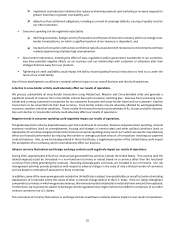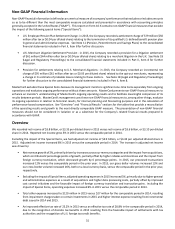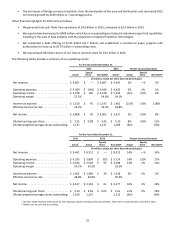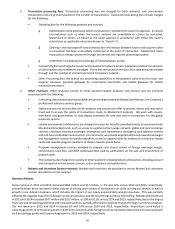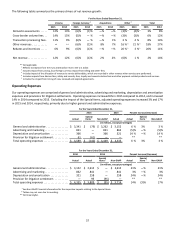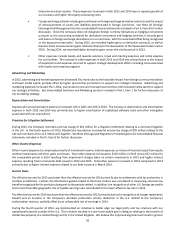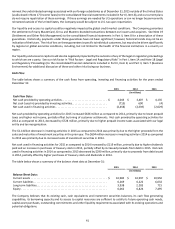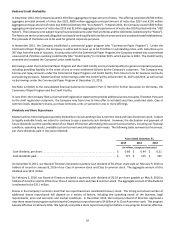MasterCard 2015 Annual Report Download - page 39
Download and view the complete annual report
Please find page 39 of the 2015 MasterCard annual report below. You can navigate through the pages in the report by either clicking on the pages listed below, or by using the keyword search tool below to find specific information within the annual report.
33
Business Environment
We process transactions from more than 210 countries and territories and in more than 150 currencies. Net revenue generated
in the United States was 39% of total revenue in each of 2015, 2014 and 2013. No individual country, other than the United
States, generated more than 10% of total revenue in any such period, but differences in market growth, economic health and
foreign exchange fluctuations in certain countries can have an impact on the proportion of revenue generated outside the United
States over time. While the global nature of our business helps protect our operating results from adverse economic conditions
in a single or a few countries, the significant concentration of our revenue generated in the United States makes our business
particularly susceptible to adverse economic conditions in the United States.
The competitive and evolving nature of the global payments industry provides both challenges to and opportunities for the
continued growth of our business. Adverse economic trends (including distress in financial markets, turmoil in specific economies
around the world and additional government intervention) have impacted the environment in which we operate. Certain of our
customers, merchants that accept our brands and cardholders who use our brands, have been directly impacted by these adverse
economic conditions.
MasterCard’s financial results may be negatively impacted by actions taken by individual financial institutions or by governmental
or regulatory bodies. In addition, political instability or a decline in economic conditions in the countries in which the Company
operates may accelerate the timing of or increase the impact of risks to our financial performance. As a result, our revenue or
results of operations may be negatively impacted. MasterCard continues to monitor political and economic conditions around
the world to identify opportunities for the continued growth of our business and to evaluate the evolution of the global payments
industry. Notwithstanding recent encouraging trends, the extent and pace of economic recovery in various regions remains
uncertain and the overall business environment may present challenges for MasterCard to grow its business. For a full discussion
see “Risk Factors - Business Risk” in Part I, Item 1A.
In addition, our business and our customers’ businesses are subject to regulation in many countries. Regulatory bodies may seek
to impose rules and price controls on certain aspects of our business and the payments industry. For further discussion, see
Note 18 (Legal and Regulatory Proceedings) to the consolidated financial statements included in Part II, Item 8 and our risk factor
in “Risk Factors - Legal and Regulatory Risks” in Part I, Item 1A. Further, information security risks for global payments and
technology companies such as MasterCard have significantly increased in recent years. Although to date we have not experienced
any material impacts relating to cyber-attacks or other information security breaches, there can be no assurance that we will be
immune to these risks and not suffer such losses in the future. See our risk factor in “Risk Factors - Business Risks” in Part I, Item
1A related to a failure or breach of our security systems or infrastructure as a result of cyber-attacks.
Impact of Foreign Currency Rates
Our overall operating results can be impacted by changes in foreign currency exchange rates, especially the strengthening or
weakening of the U.S. dollar versus the euro and Brazilian real. The functional currency of MasterCard Europe, our principal
European operating subsidiary, is the euro, and the functional currency of our Brazilian subsidiary is the Brazilian real. Accordingly,
the strengthening or weakening of the U.S. dollar versus the euro and Brazilian real impacts the translation of our European and
Brazilian subsidiaries’ operating results into the U.S. dollar. During 2015, the euro and the Brazilian real devalued against the
U.S. dollar by 16% and 28%, respectively, versus the comparable period in 2014.
The following table provides a summary of the foreign currency translational impact of changes in the U.S. dollar average exchange
rates against the euro and Brazilian real to our operating results for the years ended December 31, 2015, and 2014:
Positive (Negative) Impact from Foreign
Currency Translation
Percent
2015 2014
Net Revenue . . . . . . . . . . . . . . . . . . . . . . . . . . . . . . . . . . . . . . . . . . . . . . . . . . . . . . . . . . . . . . . . (6)% (1)%
Operating Expenses . . . . . . . . . . . . . . . . . . . . . . . . . . . . . . . . . . . . . . . . . . . . . . . . . . . . . . . . . . 4% 1%
Net Income . . . . . . . . . . . . . . . . . . . . . . . . . . . . . . . . . . . . . . . . . . . . . . . . . . . . . . . . . . . . . . . . . (7)% Less than (1)%
In addition, changes in foreign currency exchange rates directly impact the calculation of gross dollar volume (“GDV”) and gross
euro volume (“GEV”), which are used in the calculation of our domestic assessments fees, cross-border volume fees and volume
related rebates and incentives. These foreign currency impacts are incremental to the translation impacts discussed above. In




